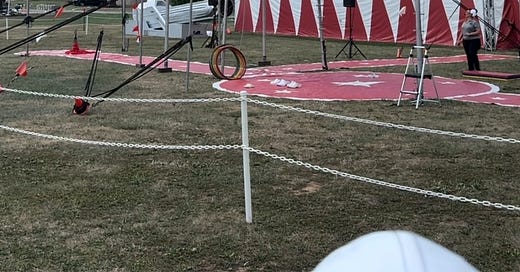Life happens. Things come up. Because of that, most people who are “good” at time management have some sort of back-up plan.
But how serious is your back-up plan? Have you actually thought it through or is it just a general sense?
I was thinking of this recently when I watched the Flying Cortes trapeze act at the York State Fair. My family went to the fair on a hot July Sunday a few weeks ago. I was so fascinated by the show that I later got in touch with Alex Cortes, one of the performers, to ask about how they planned their stunts and how they planned for things to go wrong.
One of the first things you notice about the Flying Cortes act is that their trapezes start very high in the air. The entire trapeze apparatus is also positioned over a big net.
Now in my mind, a net is a net. But Cortes quickly disabused me of this notion. “The net takes a huge beating. We have to be on top of it all the time,” he said. The Cortes family often performs outside, and even a well-practiced, simple stunt can go awry with a big gust of wind. No one exactly wants to land in the net during a show — they fall from high enough that the net can bounce you 8-10 feet in the air — but it is inevitable, and better than the alternative. So they check the net and repair the net frequently, and from the beginning, “we train ourselves to land in the net in a certain way.”
That also means that the net has to be in the right place — exactly where the performers expect it to be. If the Cortes family performs in an indoor venue where they need to change the height of their trapeze apparatus a bit, then “we have to adjust the nets to be the same height from us as with a normal apparatus,” Cortes told me. Even a few inches of difference might mean someone would over-rotate and land in a way that could lead to injury or worse.
In other words, these trapeze performers think a lot about what can go wrong — and everything is as well-planned for when things go wrong as it is for when things go right.
I think this is a good mindset in general. People set big goals, and even make time in their schedules to achieve them. Then they get discouraged because life intervenes. Someone gets sick. It rains. A plane is delayed. A vendor doesn’t deliver a product when they said they would.
These are all unfortunate events, but no less likely than a gust of wind throwing the timing of someone’s stunt off. If the outcome still matters, then best to think about the net. Check where it is placed and know exactly how to fall into it. In other words, you know what other flight you can take in the early morning when your connection out of O’Hare is canceled at night (and maybe even which hotel you’ll book). If you need to go give a speech and your spouse is out of town and your babysitter gets sick, you know who to call next…and you know they’re likely available because you checked, because you thought of all the things that could go wrong.
Nets make big things possible. They shouldn’t be afterthoughts — in the circus arts or in life.




This was fascinating to read! Much harder to implement when one has disabilities.